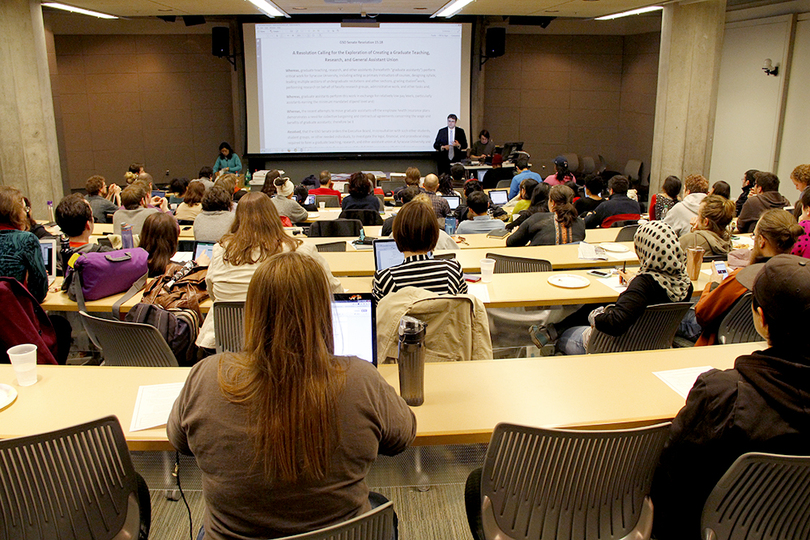Syracuse University Graduate Student Organization passes resolution favoring exploration of unionization
The Graduate Student Organization passed a resolution Wednesday night in favor of exploring the process of unionization.
Resolution 15.18 allows for the Executive Board of GSO “to investigate the legal, financial and procedural steps required” to form a union of any and all graduate students receiving pay or stipend from Syracuse University. The resolution allocated $5,000 for any personnel and research costs. The motion was carried with the majority voting yes, one no vote and three abstentions.
The decision follows a survey of many graduate assistants, research assistants and teaching assistants to gather feedback on the possibility of unionizing. The Executive Board will report back all information at the first GSO meeting of the fall semester.
The thought of unionization is in response to recent decisions made by the SU administration. Ben Kuebrich, a doctoral student in composition and cultural rhetoric, said he believes moving toward a union is necessary.
“It is important that the university does not have the power to make unilateral, undemocratic decisions,” said Kuebrich, who cited the recent announcement concerning graduate employee health insurance as an example.
Last month, SU announced that all graduate students would be required to carry a health insurance plan compliant with the Affordable Care Act by the start of next academic year. Earlier this week, Dean of the Graduate School Ben Ware released a statement saying graduate student employees could remain on their current plan until both GSO and university officials were satisfied.
Nonetheless, GSO censured the administration for the initial health care policy decision, citing the lack of transparency as a factor in the organization’s move to investigate the unionization process.
A memo distributed by GSO at the meeting also lists wage stagnation and “the general devaluing of graduate labor” as grievances.
“Some graduate students are treated really well, some graduate students are not treated as well,” said Sam Leitermann, vice president of internal affairs of GSO. “It is important for us to represent all students.”
In an open-comment period, GSO found that out of 240 responses, 129 indicated in favor of unionization, compared to 30 responses indicated no. The remaining responses requested more clarification or time on the topic.
The meeting lasted two and one-half hours, most of which was spent on debate regarding the language and implications of Resolution 15.18. Many concerns were voiced during the meeting about the cost of unionizing.
Some were worried about the standardization of graduate employee pay across all departments. Others also worried about the composition of a potential union, specifically if international students would be included.
The research process this summer will focus in part on answering these questions, along with addressing worries some international students have about the implications of losing their funding or union activity would have on their VISA status.
“The biggest concern people have is certainty,” said GSO President Patrick Neary. “Certainty that stipend rates won’t change. Certainty that health benefits won’t change. Certainty about their contracts. It really is about having a peace of mind.”
The university has said a lot of things, but has then made unannounced changes, which has motivated GSO to move toward having legal power through a union, Neary said. However, Neary said it is too soon to estimate the likelihood of unionization.
“I am hopeful about improving the relationship with the university,” Neary said. “But many people call me naïve.”
Published on April 8, 2015 at 10:08 pm
Contact Jen: jbundy@syr.edu







